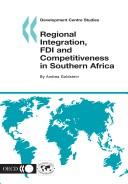| Listing 1 - 10 of 29 | << page >> |
Sort by
|
Dissertation
Abstract | Keywords | Export | Availability | Bookmark
 Loading...
Loading...Choose an application
- Reference Manager
- EndNote
- RefWorks (Direct export to RefWorks)
Rice --- Household consumption --- Imports --- economic competition --- Production increase --- Production costs --- Production economics --- Producer cooperatives --- Benin. --- Benin
Book
Abstract | Keywords | Export | Availability | Bookmark
 Loading...
Loading...Choose an application
- Reference Manager
- EndNote
- RefWorks (Direct export to RefWorks)
Business intelligence --- Corporations --- White collar crimes --- Intelligence économique --- Entreprises --- Crimes en col blanc --- Corrupt practices --- Pratiques déloyales --- Intelligence économique --- Pratiques déloyales --- Economic Competition --- Spying

ISBN: 1280173580 9786610173587 9264108726 9264108718 Year: 2004 Publisher: Paris : OECD Publishing,
Abstract | Keywords | Export | Availability | Bookmark
 Loading...
Loading...Choose an application
- Reference Manager
- EndNote
- RefWorks (Direct export to RefWorks)
This book focuses on the role of exchange rate regimes, market imperfections and trade policy to support the strengthening and diversification of the tradable sector in Argentina, Brazil and Chile. Moreover, it analyses the agro-food sector, one of the pillars of the tradable sector in the region, and the role of foreign direct investment and competition policy. Overall it provides an integrated and original policy perspective on the factors underlying international competitiveness.
Argentina -- Commerce. --- Brazil -- Commerce. --- Chile -- Commerce. --- Competition -- Argentina. --- Competition -- Brazil. --- Competition -- Chile. --- Competition --- Commerce --- Business & Economics --- Local Commerce --- Competition (Economics) --- Competitiveness (Economics) --- Economic competition --- Economic aspects --- Conglomerate corporations --- Covenants not to compete --- Industrial concentration --- Monopolies --- Open price system --- Supply and demand --- Trusts, Industrial --- Argentina --- Brazil --- Chile --- Concurrence --- Argentine --- Brésil --- Chili
Book
ISBN: 0821358928 0821358936 9786610085255 1280085258 141752359X Year: 2004 Publisher: Washington, D.C. : World Bank,
Abstract | Keywords | Export | Availability | Bookmark
 Loading...
Loading...Choose an application
- Reference Manager
- EndNote
- RefWorks (Direct export to RefWorks)
Zonder onderwerpscode: wereldeconomie, ontwikkelingsproblematiek --- Competition --- Antitrust law --- Anti-trust law --- Competition law --- Trusts, Industrial --- Commercial law --- Trade regulation --- Competition (Economics) --- Competitiveness (Economics) --- Economic competition --- Commerce --- Conglomerate corporations --- Covenants not to compete --- Industrial concentration --- Monopolies --- Open price system --- Supply and demand --- Law and legislation --- Law --- Economic aspects

ISBN: 9780521819916 9781107402430 9780511492273 0511061641 9780511061646 0511121121 9780511121128 0511492278 1280162511 9781280162510 9786610162512 6610162514 0521819911 1107136040 1107402433 0511070101 0511203683 0511326211 9780511203688 Year: 2004 Publisher: Cambridge, UK New York Cambridge University Press
Abstract | Keywords | Export | Availability | Bookmark
 Loading...
Loading...Choose an application
- Reference Manager
- EndNote
- RefWorks (Direct export to RefWorks)
In 1977 a seminal paper was published by Avinash Dixit and Joseph Stiglitz that revolutionized the modeling of imperfectly competitive markets. It launched what might be called the second monopolistic competition revolution, which has been far more successful than the first one, initiated by Edward Chamberlin and Joan Robinson in the 1930s. In this 2003 collection of essays experts in the fields of macroeconomics, international trade theory, economic geography, and international growth theory address the question of why the second revolution was so successful. They also highlight what is missing, and look forward to the next step in the modeling of imperfectly competitive markets. The text includes a comprehensive survey of both monopolistic competition revolutions, and previously unpublished working papers by Dixit and Stiglitz that led to their famous 1977 paper. With contributions from Dixit, Ethier, Neary and Stiglitz amongst others, this collection will excite interest amongst researchers, advanced students and economists.
Microeconomics --- Competition, Imperfect. --- Competition. --- Monopolies. --- Combinations in restraint of trade --- Commercial corners --- Corners, Commercial --- Engrossing --- Forestalling --- Commercial crimes --- Trade regulation --- Competition --- Monopolistic competition --- Monopsonies --- Restraint of trade --- Trusts, Industrial --- Competition (Economics) --- Competitiveness (Economics) --- Economic competition --- Commerce --- Conglomerate corporations --- Covenants not to compete --- Industrial concentration --- Monopolies --- Open price system --- Supply and demand --- Imperfect competition --- Economic aspects --- Business, Economy and Management --- Economics

ISBN: 9264006524 9789264006546 9789264006522 9786610169245 1280169249 9264006540 Year: 2004 Publisher: Paris : OECD Publishing,
Abstract | Keywords | Export | Availability | Bookmark
 Loading...
Loading...Choose an application
- Reference Manager
- EndNote
- RefWorks (Direct export to RefWorks)
By analysing investment flows and examining the role of foreign direct investment in key industries, this book examines why Southern Africa has not become a magnet for FDI and what it needs to do to attract more investment.
International finance --- International economic relations --- Southern Africa --- Competition --- Investments, Foreign --- Africa, Southern --- Economic integration. --- Capital exports --- Capital imports --- FDI (Foreign direct investment) --- Foreign direct investment --- Foreign investment --- Foreign investments --- International investment --- Offshore investments --- Outward investments --- Capital movements --- Investments --- Competition (Economics) --- Competitiveness (Economics) --- Economic competition --- Commerce --- Conglomerate corporations --- Covenants not to compete --- Industrial concentration --- Monopolies --- Open price system --- Supply and demand --- Trusts, Industrial --- Economic aspects

ISBN: 0691115273 069112793X 1400826497 1282129562 9786612129568 9781400826490 9780691127934 9780691115276 9780691127934 6612129565 9781282129566 Year: 2004 Publisher: Princeton, NJ : Princeton University Press,
Abstract | Keywords | Export | Availability | Bookmark
 Loading...
Loading...Choose an application
- Reference Manager
- EndNote
- RefWorks (Direct export to RefWorks)
From humans to hermit crabs to deep water plankton, all living things compete for locally limiting resources. This universal truth unites three bodies of thought--economics, evolution, and history--that have developed largely in mutual isolation. Here, Geerat Vermeij undertakes a groundbreaking and provocative exploration of the facts and theories of biology, economics, and geology to show how processes common to all economic systems--competition, cooperation, adaptation, and feedback--govern evolution as surely as they do the human economy, and how historical patterns in both human and nonhuman evolution follow from this principle. Using a wealth of examples of evolutionary innovations, Vermeij argues that evolution and economics are one. Powerful consumers and producers exercise disproportionate controls on the characteristics, activities, and distribution of all life forms. Competition-driven demand by consumers, when coupled with supply-side conditions permitting economic growth, leads to adaptation and escalation among organisms. Although disruptions in production halt or reverse these processes temporarily, they amplify escalation in the long run to produce trends in all economic systems toward greater power, higher production rates, and a wider reach for economic systems and their strongest members. Despite our unprecedented power to shape our surroundings, we humans are subject to all the economic principles and historical trends that emerged at life's origin more than 3 billion years ago. Engagingly written, brilliantly argued, and sweeping in scope, Nature: An Economic History shows that the human institutions most likely to preserve opportunity and adaptability are, after all, built like successful living things.
History of civilization --- Natural history --- Economic aspects --- Competitive Behavior. --- Economic Competition. --- Evolution. --- Economic aspects. --- 330 --- 338 <09> --- AA / International- internationaal --- 331.100 --- Theoretische economie. Economische theorie. Economische analyse --- Economische geschiedenis --- Economische geschiedenis: algemeenheden. --- 338 <09> Economische geschiedenis --- 330 Theoretische economie. Economische theorie. Economische analyse --- Science --- Natural science --- Science of science --- Sciences --- History, Natural --- Physiophilosophy --- Competition, Economic --- Competitions, Economic --- Economic Competitions --- Commerce --- Behavior, Competitive --- Behaviors, Competitive --- Competitive Behaviors --- Biology --- Economische geschiedenis: algemeenheden --- Competitive behavior --- Competitiveness (Psychology) --- Conflict (Psychology) --- Interpersonal relations --- Motivation (Psychology) --- Philosophy --- Creation --- Emergence (Philosophy) --- Teleology --- Competition --- Competition (Economics) --- Competitiveness (Economics) --- Economic competition --- Conglomerate corporations --- Covenants not to compete --- Industrial concentration --- Monopolies --- Open price system --- Supply and demand --- Trusts, Industrial --- Natural sciences --- Natural history - Economic aspects

ISBN: 1858988306 Year: 2004 Publisher: Cheltenham Elgar
Abstract | Keywords | Export | Availability | Bookmark
 Loading...
Loading...Choose an application
- Reference Manager
- EndNote
- RefWorks (Direct export to RefWorks)
Economic law --- 658.11 --- Cartels --- Competition --- Price fixing --- Collusion on pricing --- Collusive pricing --- Fixing, Price --- Horizontal price fixing --- Price collusion --- Pricing --- Restraint of trade --- Competition (Economics) --- Competitiveness (Economics) --- Economic competition --- Commerce --- Conglomerate corporations --- Covenants not to compete --- Industrial concentration --- Monopolies --- Open price system --- Supply and demand --- Trusts, Industrial --- Combinations, Industrial --- Combinations in restraint of trade --- Industrial combinations --- Big business --- Commodity control --- Interlocking directorates --- Kinds and forms of enterprise --- Law and legislation --- 658.11 Kinds and forms of enterprise --- Economic aspects --- Competition.

ISBN: 1843762781 Year: 2004 Publisher: Cheltenham : Elgar,
Abstract | Keywords | Export | Availability | Bookmark
 Loading...
Loading...Choose an application
- Reference Manager
- EndNote
- RefWorks (Direct export to RefWorks)
Business policy --- #SBIB:35H203 --- #SBIB:316.334.2A551 --- Overheidsmanagement: strategisch management --- Partijen en strategieën in de onderneming: ondernemingsbeleid en management --- Competition --- Competition, International --- Strategic planning. --- Management. --- Strategic planning --- Goal setting (Strategic planning) --- Planning, Strategic --- Strategic intent (Strategic planning) --- Strategic management --- Planning --- Business planning --- Competition (Economics) --- Competitiveness (Economics) --- Economic competition --- Commerce --- Conglomerate corporations --- Covenants not to compete --- Industrial concentration --- Monopolies --- Open price system --- Supply and demand --- Trusts, Industrial --- International competition --- World economics --- International relations --- International trade --- War --- Management --- Economic aspects

ISBN: 128017059X 9786610170593 9264105948 9264105921 Year: 2004 Publisher: Paris : OECD Publishing,
Abstract | Keywords | Export | Availability | Bookmark
 Loading...
Loading...Choose an application
- Reference Manager
- EndNote
- RefWorks (Direct export to RefWorks)
This report addresses an issue which arises in virtually every public utility industry – the regulation of access to essential facilities. The regulation of the terms and conditions under which competing firms have access to essential inputs provided by rivals has become the single biggest issue facing regulators of public utility industries. Development of competition and the success of liberalisation often depend on the access terms and conditions chosen, and public policy interest in getting these terms and conditions right is important. Prepared by the OECD’s Competition Committee, this report focuses on the telecommunications industry and seeks to deepen the understanding of access regulation. Access issues are not easy issues for regulators and competition policy-makers - they can be both difficult technically and the source of noisy disputes in practice. By bringing together theory and practice, this report seeks to help regulators and policy-makers learn from OECD experience to achieve efficient and competitive outcomes.
Competition. --- Telecommunication -- Rates -- Law and legislation. --- Telecommunication policy -- Economic aspects. --- Telecommunication --- Telecommunication policy --- Competition --- Business & Economics --- Transportation Economics --- Law and legislation --- Rates --- Economic aspects --- Competition (Economics) --- Competitiveness (Economics) --- Economic competition --- Telecommunication and state --- Electric communication --- Mass communication --- Telecom --- Telecommunication industry --- Telecommunications --- Government policy --- Commerce --- Conglomerate corporations --- Covenants not to compete --- Industrial concentration --- Monopolies --- Open price system --- Supply and demand --- Trusts, Industrial --- Communication --- Information theory --- Telecommuting --- Law and legislation. --- Economic aspects.
| Listing 1 - 10 of 29 | << page >> |
Sort by
|

 Search
Search Feedback
Feedback About UniCat
About UniCat  Help
Help News
News